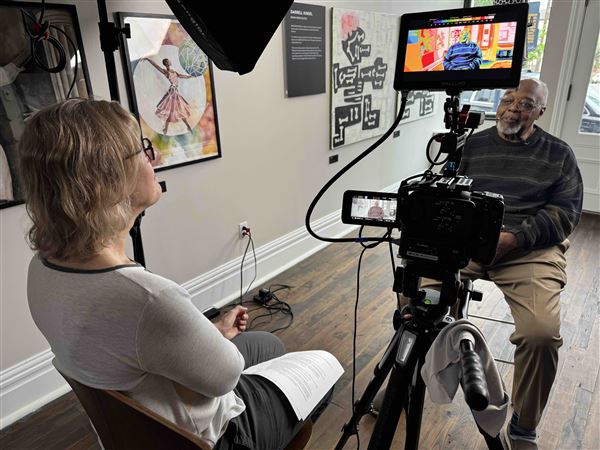With a wall-sized video projector and PowerPoint clicker at his disposal, Elijah Mayfield instead chose a letter from a New York City school teacher in the Bronx to help introduce his company, LightSide Labs, to the audience Wednesday at Alpha Lab's Demo Day and Technology Preview.
The typed note sent last month after the teacher's students received laptops through a grant award discussed the challenge of giving 25 children the personal attention required to help them excel as writers. The teacher contacted LightSide to see if the company's digital writing assessment platform could help to transform students just learning to operate computers into budding linguists.
Weaving that teacher's personal struggle into statistics about the $91 billion e-learning industry, the sales pitch captivated more than 400 guests at New Hazlett Theater on the North Side. Facing the mixed-bag audience featuring tech enthusiasts and curious investors, Mr. Mayfield had decided that discussing what makes the technology important took priority over discussing what makes it work.
"When you're not talking to people that can have a conversation about machine learning, you really need to tap into that personal aspect of how this technology impacts people," he said.
Selling ideas developed over years in what can be 10 minutes, or even 30 seconds, to rooms full of strangers with the power to make or break brands can be both exciting and intimidating. The personal, financial and social impacts of a given technology all come into play during the pitch process -- a sales presentation that most tech entrepreneurs seeking funds or support go through at some stage of existence.
Knowing how to refine the message depending on the audience is half the battle.
One crowd-friendly approach might be a simple demonstration, such as the one C.J. Handron, CEO of sports motion kinetics company Diamond Kinetics, conducted last week. Swinging a baseball bat wired with a Diamond Kinetics sensor, Mr. Handron showed the crowd a report generated by the technology that tracked the swing's force, speed and angle.
Steve Cotter, president of data gathering company Collected, used the projection screen to show the product searching emails, PowerPoint slides and saved documents to find relevant information for specific projects.
For Rich Lunak, president and CEO of South Side-based state sponsored seed stage investment firm Innovation Works, learning to properly pitch a company's mission is as important for Alpha Lab's cohorts as building a product and finding a team. Alpha Labs is an Innovation Works program.
From the first week in the program, entrepreneurs are taught to pitch.
They practice with "elevator drills" giving them 30 seconds or less to sell their company's stories and business plans. Pitch lessons continue throughout the 20-week process as business models and market strategies are refined.
Entrepreneurs deliver "mini-pitches" in the run-up to Demo Day, coached by Innovation Works and Alpha Lab staff members, and have had at least one opportunity to test their speech in front of an audience prior to the big day.
For uncoached entrepreneurs delving into pitch competitions for the first time, research, practice and constant rewrites are the name of the game, says Kit Mueller, founder of the tech marketing initiative RustBuilt.
Mr. Mueller was instrumental in organizing Pittsburgh Startup Weekend, a 54-hour event where potential entrepreneurs pitch ideas to a room full of people who will help bring the best ideas to fruition before the weekend's end.
With Pittsburgh Startup Weekend regularly drawing crowds that have little to no business background, Mr. Mueller said attendees are urged to focus on four areas: the market the product intends to reach, the design that will support the idea, market validation showing the idea is necessary and a plan to bring the idea from concept to reality.
He said he also tells attendees to identify the "secret sauce" that makes their business idea rise above all others. Whether that sauce comes in the form of a solid development team, a proven tech background or infectious enthusiasm is for entrepreneurs to decide.
When it comes to pitching during an event such as Tech Cocktail's Startup Showcase and Mixer, which hosted its first event in Pittsburgh on Oct. 11, the restrictions of a 60-second time limit may be the biggest hurdle to reaching an audience. Chicago-based Tech Cocktail hosts pitch competitions throughout the nation and chooses winners from each city who will pitch during a national trade show in downtown Las Vegas later this year.
Phil Anderson, who pitched his online budgeting company BudgetSimple at both Tech Cocktail and Demo Day, said he's still working to perfect the art of the elevator pitch.
But in the process of building three businesses over 14 years, he has learned to research his audience and to craft messages specifically for each group. Tech aficionados get details about how BudgetSimple links to bank accounts and maintains security; potential investors get figures regarding the number of users on the site; and how many convert to paid accounts. Budget Simple currently has 130,000 registered users.
For groups not easily defined by a single label, Mr. Anderson said a wholesale approach explaining what problem the business solves is the best way to go.
"Educate people that there is a problem. We had to convince people that the problems with budgeting online and what customers are getting for their money isn't solved," he said.
"We had to prove there was a problem and that we are the solution."
First Published: October 27, 2013, 4:00 a.m.















